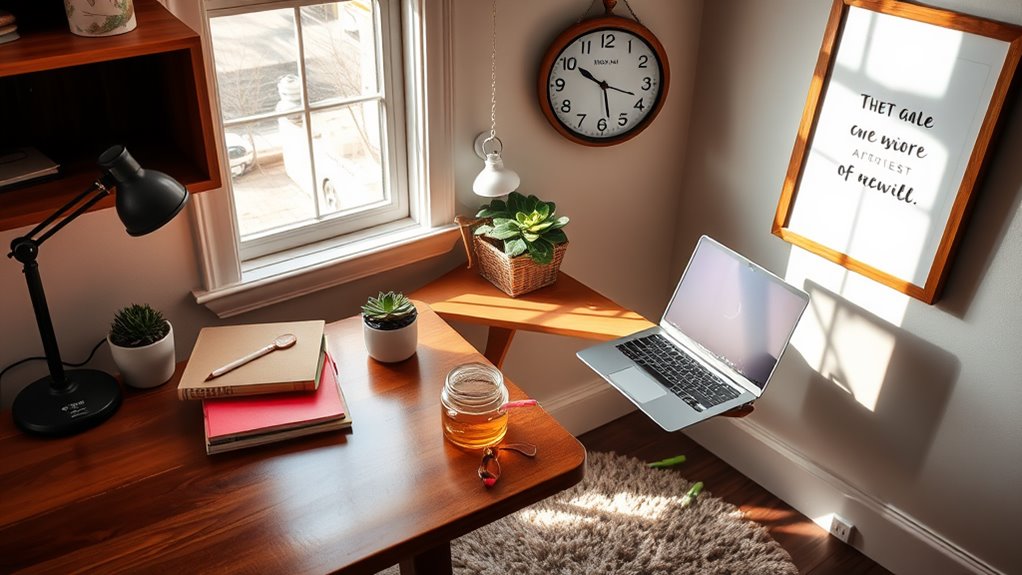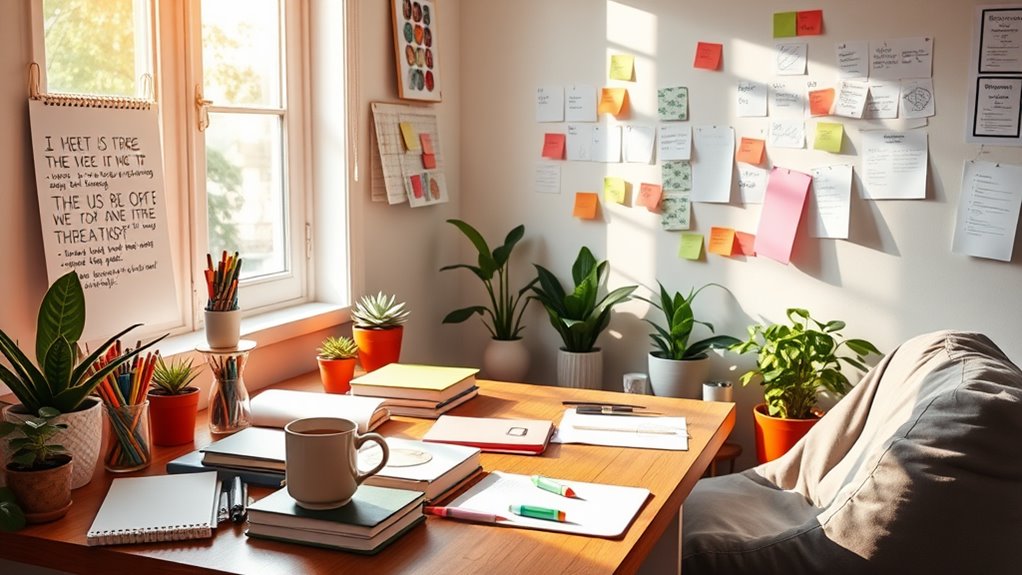The Study Routine Every Student Needs to Know
To create a study routine that boosts your academic success, start by setting specific goals for each session. Use the Pomodoro Technique—study for 25 minutes and take a 5-minute break. Keep your study area organized, quiet, and comfortable to minimize distractions. Engage in active recall and spaced repetition to reinforce your learning. Regularly reward yourself for completing tasks to maintain motivation. Remember, structuring your study time effectively not only sharpens focus but also reduces stress. You can gain access to even more tips to refine your routine and enhance your study experience, ensuring you’re always at your best.
Key Takeaways
- Establish a consistent study schedule to enhance focus and minimize procrastination.
- Utilize the Pomodoro Technique to maintain productivity and prevent burnout.
- Set specific goals for each session to improve concentration and retention.
- Optimize your study environment by minimizing distractions and ensuring comfort.
- Incorporate active recall and spaced repetition to reinforce learning and understanding.
Importance of a Study Routine
While you might think studying whenever you feel like it’s sufficient, establishing a study routine is vital for academic success. A consistent schedule helps you create a productive environment, allowing your brain to focus and absorb information more effectively.
It also minimizes procrastination since you’ll have designated times for studying. By sticking to a routine, you’re training your mind to expect study periods, making it easier to get started each day.
Additionally, a structured approach helps balance your academic and personal life, reducing stress. You’ll notice improved retention and understanding of the material, leading to better grades.
Plus, a routine fosters discipline, which is important not just in school but in life. Embrace the power of a study routine and watch your academic performance soar!
Time Management Techniques
Effective time management techniques can transform your study routine and enhance productivity. Start by setting specific goals for each study session.
Break your work into manageable chunks, using the Pomodoro Technique—study for 25 minutes, then take a 5-minute break. This keeps your focus sharp and prevents burnout.
Prioritize tasks using a to-do list, ranking them by importance and deadlines. Don’t forget to allocate time for revisions and practice tests.
Use tools like calendars or apps to schedule your study blocks, ensuring you stick to your plan.
Finally, be flexible. Life happens, and adjusting your schedule is okay.
Optimizing Your Study Environment
Creating an ideal study environment can greatly enhance your focus and retention. Start by choosing a quiet, well-lit space, free from distractions like your phone or noisy roommates.
Make certain your study area is organized; clutter can hinder your concentration. Consider the temperature—too hot or cold can be uncomfortable, so adjust it to your preference.
Use comfortable furniture that supports good posture, as discomfort can break your focus. Personalize your space with motivational quotes or plants, as they can positively impact your mindset.
Finally, keep necessary supplies within reach to minimize interruptions. By optimizing your environment, you’ll create a space that fosters productivity and helps you absorb information more effectively.
Effective Study Techniques
When you want to boost your study efficiency, employing the right techniques can make all the difference. Start by using active recall—test yourself on what you’ve learned instead of just re-reading notes.
Next, try spaced repetition; review material at increasing intervals to enhance retention. Incorporating visual aids like mind maps or flashcards can also solidify your understanding.
Additionally, break your study sessions into manageable chunks using the Pomodoro Technique—study for 25 minutes, then take a 5-minute break. Group study can be beneficial too, as discussing topics with peers often leads to deeper comprehension.
Finally, always prioritize understanding concepts over memorization for long-term success. Adopting these effective techniques will transform your study routine and improve your academic performance.
Maintaining Motivation and Focus
Staying motivated and focused while studying can often be just as important as the techniques you use. Here are three strategies to help you maintain your drive:
-
Set Clear Goals: Break your study material into manageable chunks and set specific goals for each session. This helps you stay on track and gives you a sense of accomplishment.
-
Create a Distraction-Free Environment****: Find a quiet space where you can concentrate. Keep your phone out of reach and close unnecessary tabs on your computer.
-
Reward Yourself: After completing a study session or hitting a goal, treat yourself. Whether it’s a snack, a short walk, or a quick episode of your favorite show, rewards can boost your motivation to keep going.
Frequently Asked Questions
How Do I Create a Personalized Study Schedule?
To create a personalized study schedule, assess your goals, identify your peak productivity times, and allocate specific time blocks for each subject. Adjust as needed, ensuring you balance study with breaks and leisure activities.
What Tools Can Help Me Track My Study Progress?
To track your study progress, try using apps like Trello or Notion for organization. You can also use Google Sheets for tracking time spent. Regularly reviewing your notes helps reinforce learning and keeps you motivated.
How Can I Avoid Procrastination During Study Time?
To avoid procrastination during study time, set specific goals, break tasks into smaller chunks, and eliminate distractions. Use timers for focused sessions, and reward yourself after completing each task to stay motivated and engaged.
Should I Study Alone or With a Group?
Deciding whether to study alone or with a group depends on your learning style. If you thrive in collaboration, groups can motivate you. If you need focus, studying alone might help you absorb information better.
How Do I Handle Distractions While Studying?
To handle distractions while studying, you can create a dedicated study space, set specific goals, and use techniques like the Pomodoro method. Turn off notifications and let others know you’re focused on your work.





